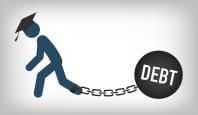Student loan debt today is reaching outrageous numbers, edging well into the trillions, and leaving many not just with just a substantial amount of resentment for a variety of reasons, but also with a great deal of stress when that monthly payment rolls around. No matter the level of success out of college, it can still be a challenge to pay off tens of thousands of dollars of debt, and sometimes far more than that. If your student loan debt is the equivalent of what some pay for a mortgage, undoubtedly you are looking toward the day that it is gone. And ironically, while paying out those sums each month may be what contributes to filing for bankruptcy, student loans generally cannot be discharged in any chapter of bankruptcy, whether you are seeking a near liquidation in Chapter 7, or reorganizing and paying off debts in a structured Chapter 13 plan.

In the cases that a student loan is discharged, that is because the student loan debtor, in bankruptcy, also filed to see it included as dischargeable because of ‘undue hardship.’ This is actually listed as something that happens in ‘rare cases’ by the Federal Student Aid Office. If you endeavor to prove undue hardship, it’s up to you then to show the bankruptcy court that this would cause extreme difficulty not only for you, but that it would affect your dependents too, should you have any. Then, during an adversary hearing, the bankruptcy court examines your circumstances to see if the following is true:
- In continuing to pay back the student loan, you would no longer be able to keep up what is considered a minimal standard of living for yourself or your family.
- These extenuating circumstances causing you to have difficulty repaying the student loan would be continuing throughout the time period agreed on for the loan.
- You have shown yourself to be working diligently in repaying the loan previously, dispelling any thoughts that filing for undue hardship is just a deliberate (and perhaps fraudulent) attempt to get out of paying the loan altogether.
While it may indeed be a rare occurrence that undue hardship is agreed upon by the bankruptcy court, if you think you can truly can meet these requirements it may very well be worth your time and efforts to try and prove. If you win your case at the adversary hearing, this clears your student loan debt completely. Not only that, you are even eligible for federal student loans again in the future (something one might consider very carefully, for sure, considering past experience).
Whether you are considering how to handle student loan debt, thinking about filing for bankruptcy, or exploring other options for debt reorganization, contact us at Fitzgerald & Campbell, APLC. Our attorneys have decades of experience in serving clients with similar financial situations, as well as navigating student loan debt and bankruptcy. Let us review your case and discuss what would work best for you. We are here to help!
Call us today for a free consultation at (844) 431-3851, or email us at info@debtorprotectors.com.

